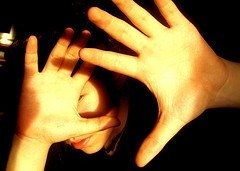|
Photophobia
Do you feel a painful sensation in your eyes when you walk outside on a sunny day? Do your eyes bother you when you are on the computer from the glare of the monitor? Do you experience eye discomfort induced by light, whether the light is natural or artificial? You may have Photophobia. What is Photophobia?
It is not an eye disease by itself, but a fairly common symptom. If you have always been sensitive to light, it may be because your pupils are large and your iris (the colored part of the eye) cannot constrict enough to reduce the light entering the eye. Perhaps your iris is light-colored and thus has little pigment. Pigment in the iris can serve to absorb some of the light and thus block light from getting in the eye. With less pigment, more light passes through the iris and gets in the eye at discomforting levels. Despite the discomfort caused by large pupils or light-colored eyes, neither of these are eye diseases. Now suppose that rather than being a longstanding, chronic sensitivity to light, you experience a sudden and painful sensitivity to light. Photophobia can be described as an abnormal sensitivity to light which is associated with underlying eye disease or other health conditions. It can cause severe eye pain even in relatively low light. 
What are the causes?
Photophobia can be caused by a wide array of eye and health conditions. Disorders of the Cornea (the transparent tissue in front of the iris) such as: Eye disease, injury of infection such as Eye testing in which the eyes have been dilatedDrugs and/or poisons which can dilate the pupil such as More rarely, severe potentially-deadly conditions like How it is treated and managed?
If you experience sudden Photophobia consult an eye care provider immediately. Your eye doctor will rule out if any eye disease is causing the symptom. The key to any diagnosis will begin with your description of symptoms. Your eye doctor will want to know when the symptoms began. Is the pain constant or intermittent? How severe is it? Did a doctor recently dilate your pupils? Do you use Contact Lenses? Have you been around dust, wind, sun, pollens, or chemicals? Have you been injured? What medications do you take? Is your vision blurred? What other symptoms do you have? Once your eye doctor finds the underlying cause, the treatment plan can then be developed. Now, while the underlying cause is being investigated, there are a few things you can do to help yourself deal with the symptoms: Wear dark glasses: Remember that you should seek urgent medical attention if your symptoms are moderate to severe even in low-light conditions. |




